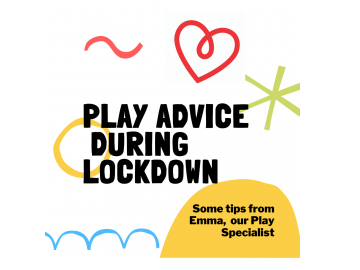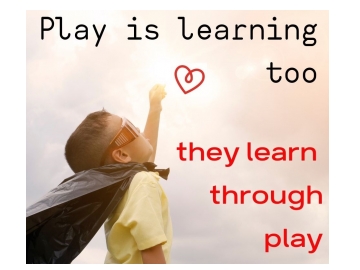Lorem ipsum doler sit amet.
-
Firstly – Thank you for staying at home and keeping yourselves, your family and key workers safe.
I wanted to share with you some ideas of things you can do whilst at home, but most importantly I wanted to tell you all that you are ALL doing an amazing job! -
A key piece of advice I want to share is only do what you can do. It doesn’t matter if you aren’t able to deliver a full days school work or if your child has spent a little longer watching TV or on an electronic device. You may even find that your child/ren doesn’t listen to you when you try to teach them, don’t worry! This is all normal and is being experienced by many parents all over – you are not alone in this.

-

This is why I think the most important thing to share in all this is: Play is learning too! Children learn through playing, it helps them to process what they are doing and how they are feeling about everything and let’s face it, if we as adults are a bit confused or anxious at this time, our children will be too. So don’t feel guilty if your child hasn’t done any maths, English or science today, because they will still be learning through playing. We all need to be kind to each other, but also be kind to yourselves. Don’t set unachievable targets; it will only make you feel you are failing if you aren’t able to achieve them all. Aim for a little bit each day and let them play and learn through this too. Helping to make lunch or help with household chores can be just as effective way of learning. Not all learning has to be academic – life lessons are just as invaluable to your child/ren.
-
Children when at school, would have a form of routine to their day. Don’t feel you have to make a timetable and stick to it rigidly, however give some considerations to having some sort of flexible structure to each day. Doing this can help children (in particular those with individual needs) feel safe and secure.

-

More importantly – enjoy your child/ren. Learn about them, what they like, what worries them, what excites them. Think of this period as a gift of time, quality time that you don’t get in abundance in usual circumstances. Enjoy being with your children and it will only strengthen your bond. Don’t feel pressure to make everything perfect. Relax and learn about their personalities and learning styles and make memories to last beyond this time.
And if you happen to have a bad day, then park it – move on, tomorrow is another day – even as adults, not every day is a good day and some days you are less productive than others, so recognise this and let it go!
-
Here are just some simple ideas to help you whilst you are social distancing and staying at home with your babies and children:
• Keep a diary: a written or a video diary (whatever works for you and your family) – it’s a great way to log what you’ve achieved and something to look back on.
• Make salt dough (lots of recipes online)
• Make a fingerprint charm that you could send to other family members so they can still feel connected.
• Paint, colour, draw, collage rainbows and decorate your windows. This is great for helping children to feel connected to other children when they do go out for exercise they can spot other rainbows in windows. Try the skittles rainbow science experiment!
-
• Stories – reading is so important in learning, share a story together. If your child is older – start a ‘book club’ read the same book – discuss it after. For younger children – read together, maybe act it out or draw or write something from the story.
• Junk Modelling – never mind recycling bins – this is the most effective use of old bits of cardboard, plastic containers! Let your child’s imagination take over – let them build and explore.
• For younger children imaginative play is a key learning tool: play shops/cafes/start a beauty salon.
• Use the time to all learn a new skill together as a family – a musical instrument or a language (online videos to help).
• Maybe learn British Sign language or Makaton – have a new sign each day and try to use it throughout the day.
• Sensory hunt – hide things around the house and get your child to use different senses to find the hidden objects. For older children, get them to hide things and ask them to write clues to help you find whatever is hidden. -

Make a bird feeder and make up some bird feed (lots of ideas online on how to do this) – then spot which birds use it – draw them.
Make up a dance with your child and share online (tik tok or elsewhere). Have a set period of time in your day to play music and dance together – have fun, relax, go a little mad – your child will love to see you have fun this way and it’s a great exercise for you all!
Massage – baby massage for little ones (lots of online teaching) or story massage for slightly older – tell them a story and use different strokes on their backs to tell the story.
Collect pebbles/ rocks when out for a walk, take home to decorate and re- hide when next out or decorate them with words of kindness to keep at home.
Get your child to draw themselves and write what they love about themselves on or around the picture. This is good for self-positivity – if your child struggles to think of things this is a great time to boost their self-confidence and for you to tell them what you love about them (kind, caring, funny etc)
Make up your own word searches, puzzles or quizzes – email to family or friends and set them a challenge to complete it and send one of their own back in reply.
Make your own exercise dice (use a cereal box or similar and turn inside out and fold and secure into a cube). You can write different actions to do on each side and take turns to roll the dice and do the action.
Baking or cooking – doesn’t have to be anything fancy and sometimes the process is just as much fun, but this is a great way to add in mathematical language (more/ less/ Kg – measuring/ counting).
At the end of each day spend some time with your child talking to them about their day – what they’ve achieved, what they enjoyed, did they find anything particularly hard. This small moment of reflection is invaluable to keeping you and your child connected and grounded. It gives you something positive to take forward to each new day.
-
Finally, a nice activity to do together with school aged children might be this:
Draw a large tree together – talk about how the child is like a tree. Discuss the roots and how they keep us strong – discuss what this could be for them (family, things they enjoy doing, pets etc). Then talk about the leaves – seasonal, come and go (school, hobbies). Then talk about wind – external things that can change the leaves on the tree (ie. this pandemic may blow the leaves away, but the roots will keep the tree strong) Talk about how like trees we are stronger despite the wind and because of our root system.
Please remember these are just some ideas to keep you going! Please feel free to share your ideas in the comments section – let’s get this as a resource bank of ideas for us all to get us all through this time together!
Have fun and enjoy playing with your child/ren!

